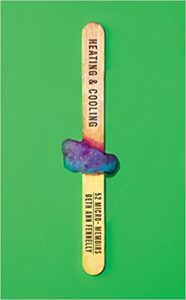Five Questions for 4X4CLT Featured Writer Beth Ann Fennelly
How did your foray into micro-memoir evolve—did these pieces begin as prose poems or were they their own specific beast from the start?
Before I published this book, my husband and I wrote a collaborative novel. Called The Tilted World (HarperCollins, 2013), it was set in the flood of the Mississippi River in 1927, and it ended up being a big project. Although we’d each published four books, we’d never written one together. In addition to teaching ourselves how to collaborate, we had to do a lot of research. And it was high stakes: we spent four years writing the novel. Imagine, if it failed, how costly that would have been for our marriage.
Luckily, it didn’t fail. After we returned from book tour, tuckered, I wasn’t sure what I wanted to write next. There followed a long, frustrating, fallow period in which I wasn’t writing. I mean, sure, I was scribbling little thoughts and ideas in my notebook, but nothing was adding up to anything. Many of my scribbles were just sentences, or a paragraph, the longest just a few pages. I kept complaining to my patient husband that I was “not writing.” Eventually, however, it occurred to me that I was enjoying this scribbling in my notebook. After the high stakes, research-heavy, character-imbedded-thinking of the novel, my own life seemed rich material again. The little memories or quirky thoughts or miniature scenes I was creating seemed refreshing. So, strangely, I identified the feeling of writing before I identified the activity. I thought, What if this “not writing” I’m doing actually is writing, and I just don’t recognize it because it doesn’t look like other writing I’ve done? What if I need to stop waiting for these things to add up to something, and realize maybe they already are somethings, just small? Once I’d recognized the form and gave it a name, the micro-memoir, I realized I was almost done with a book.
You write about motherhood with a clear-eyed honesty that is anything but the dreaded “s” word so often tagged on writers who are mothers (“sentimental”). Could you talk about your experience of writing as a mother and the reception of that work?
When I was pregnant the first time, I devoured all the mothering books, in an effort to be supremely well informed. But nothing prepared me for motherhood, which is so much better and harder and weird and wilder than I had expected. So much funnier, too. I wrote about my experiences as a mom to try to understand them. And people have sometimes praised this writing for its lack of sentimentality—which makes me happy—it was important to me not to sentimentalize, because that simplifies and cheapens the mystery that is motherhood.
Would you share the most useful piece of writing advice you ever received?
When I was in grad school, my first year, I had a conference with the poet Jack Gilbert, and he read a sheaf of my poems, which were pretty over-determined and directed, and told me a story. He said that in the 1970s, the city of Amsterdam had a taxi shortage, because so many tourists were swamping the city and because there’s a rigorous licensing for taxi drivers in the city, due to its numerous bridges and one-way roads. The city solved the problem by initiating a new kind of taxi. Instead of taking the full-fare, licensed, traditional black taxi, one could take a half-priced red taxi, but the ride might be less direct, might incorporate a detour or two. He said, “Beth Ann, take the red taxi.”
What should people know about literary life in Mississippi?
Oxford, MS is a very literary place—Faulkner’s house, and PW’s “Best Bookstore of the Year,” Square Books—and Oxford felt like home from the moment I arrived. We recently bought five plots in the cemetery where Faulkner is buried! So we’re here eternally, now.
Note: Fennelly serves as poet laureate for the state of Mississippi and as director of the MFA program at the University of Mississippi, where she teaches poetry and nonfiction writing.
Which writers do you read for inspiration?
That changes all the time. Lately—Maggie Nelson, Claudia Rankine, Edouard Leve, Kaveh Akbar, Issa, Catherine Lacey, and Maggie O’Farrell.
Beth Ann Fennelly’s writing was featured on Charlotte Lit’s 4X4CLT Series 2 Number 4 posters, released in December 2017. She is the author of three poetry books: Open House, Tender Hooks, and Unmentionables, all with W. W. Norton. Beth Ann’s poetry has been in over fifty anthologies, including Best American Poetry 1996, 2005, and 2006. She is the author of a book of essays, Great With Child: Letters to a Young Mother (Norton, 2006). She co-authored with her husband Tom Franklin The Tilted World (HarperCollins, 2013), a novel set during the 1927 flood of the Mississippi River. Beth Ann’s newest book, published by W. W. Norton in October 2017, is Heating & Cooling: 52 Micro-Memoirs.


